-
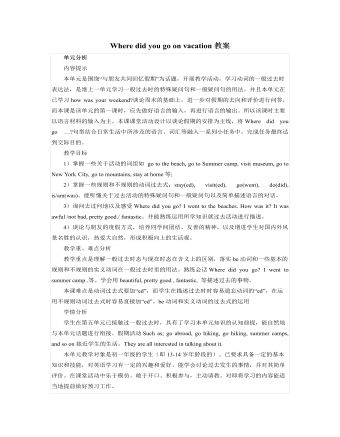
人教版新目标初中英语七年级下册Where did you go on vacation教案
句型: Where did you go on vacation? I went to summer camp.Did she go to Central Park?Yes,she did.No, she didn’t语法:一般过去时特殊疑问句、一般疑问句及肯、否定回答。课时安排4课时第一课时:Section A:la,1b,lc,2a,2b,2c 第二课时:Section A:3a,3b,4第三课时:Section B:1,2a,2b,2c第四课时:Section B:3a,3b,3c,4 and Self Check第一课时教学目标掌握描写假期生活的形容词。假期里自己所做事情的简单表达。谈论假期做的事情及当时情况。谈论假期时旅游的天气,旅游者以及食物等。教学过程一、导入播放一首英文歌曲:Let’s travel 说明:通过让学生听节奏欢快迪斯尼英语歌曲Let’s travel.引入本节课谈论的话题vacation and travel. 让歌曲使学生的思维活跃,增强课堂气氛,激发学生提高学习英语的兴趣。T:How is the trip ?Ss : It’s pretty good/ happy/exciting /relaxing/busy/dangerous/ fantastic说明:这个问题是为了操练形容词。建议让多个Ss作答。鼓励他们用不同的形容词。上述个别形容词本应在第二课时中出现,但可以在warming-up中第一次非正式出现。这些形容词也可在老师的评价语中适时出现,以加深学生对词汇的印象。
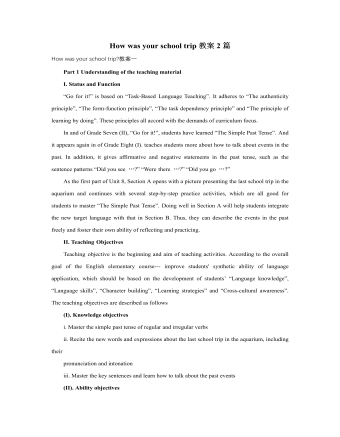
人教版新目标初中英语八年级上册How was your school trip教案2篇
“Go for it!” is based on “Task-Based Language Teaching”. It adheres to “The authenticity principle”, “The form-function principle”, “The task dependency principle” and “The principle of learning by doing”. These principles all accord with the demands of curriculum focus.In and of Grade Seven (II), “Go for it!”, students have learned “The Simple Past Tense”. And it appears again in of Grade Eight (I). teaches students more about how to talk about events in the past. In addition, it gives affirmative and negative statements in the past tense, such as the sentence patterns “Did you see …?” “Were there …?” “Did you go …?” As the first part of Unit 8, Section A opens with a picture presenting the last school trip in the aquarium and continues with several step-by-step practice activities, which are all good for students to master “The Simple Past Tense”. Doing well in Section A will help students integrate the new target language with that in Section B. Thus, they can describe the events in the past freely and foster their own ability of reflecting and practicing. II. Teaching ObjectivesTeaching objective is the beginning and aim of teaching activities. According to the overall goal of the English elementary course--- improve students' synthetic ability of language application, which should be based on the development of students’ “Language knowledge”, “Language skills”, “Character building”, “Learning strategies” and “Cross-cultural awareness”. The teaching objectives are described as follows(I). Knowledge objectivesi. Master the simple past tense of regular and irregular verbsii. Recite the new words and expressions about the last school trip in the aquarium, including their pronunciation and intonation
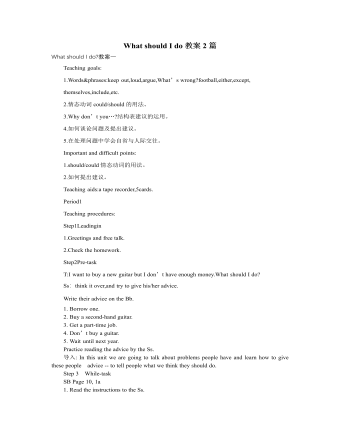
人教版新目标初中英语八年级下册What should I do教案2篇
说明:在帮Li Lei提建议的同时,教育学生如何学好英语。第三课时教学目标1. 语言目标:a) 词汇: Original, in style, haircut, the same as.b) 语言结构:My friend wears the same clothes and has the same haircut as I do.2. 能力目标:大多数学生能够谈论自己喜欢哪种服装,提高查找信息的能力。3. 情感目标:学会如何与朋友相处,要有自己对时尚的看法。教学重点掌握一些重要词汇。教学难点学会谈论问题,并能提出书面建议。◆教学突破首先针对Erin的问题,提出个人的建议,模仿2c部分的对话展开双人交际Pair-work;听老师诵读3a部分的信件,并找出LEFT OUT的问题所在;学生完成3b部分的内容,给Left Out提出书面的建议;学以口头形式提出自己目前存在的某个问题,讲给大家听,让同学们给自己提出一个建议,并作笔录;学生两、三个人分成一组,随意性地进行口语交际,谈论P14的第4部分的某个问题,相互交换意见。

人教版新目标初中英语九年级上册Where would you like to visit教案2篇
The First PeriodⅠ.Teaching Aims and DemandsKnowledge Objects(1) Key Vocabularytiring, educational, fascinating, thrilling, peaceful, exotic, trek, jungle, take it easy, explore, historic, site(2) Target LanguageWhere would you like to go on vacation?I’d like to trek through the jungle, because I like exciting vacations.2. Ability Objects(1)Train students to talk about places they would like to visit with the target language.(2)Train students to describe vacations with different adjectives.(3)Train students' listening skill.3. Moral Object,It′s more interesting to go on vacating somewhere instead of staying at home.Ⅱ. Teaching Key Points1. Key Vocabularytiring, educational, fascinating, thrilling, peaceful, exotic, trek, jungle, take it easy, explore, historic, site2. Target LanguageTalk about different places with the target language.Ⅲ. Teaching Difficult Points1. Describe vacations with different adjectives.2. Talk about different places with the target language.Ⅳ. Teaching Methods1. Teaching by illumination2. Teaching by doing chain drills3. Teaching by pairworkⅤ. Teaching Aids1. A tape recorder2. Some pictures of different places with famous views

人教版新目标初中英语九年级下册Rainy days make me sad教案
1. 教材分析本单元以how do things affect you?为话题, 从颜色、天气、音乐、广告、产品等方面谈论了外界事物如何影响人的心情。要求学生掌握表达某物或某事给人带来的感觉、看法或影响等。共设计了四个部分的内容:Section A 该部分有4个模块:第一模块围绕Which restaurant would you like to go to?这一话题展开思维(1a)、听力(1b)、口语(1c)训练;第二模块围绕How does music affect you? 进行听力(2a-2b)、口语训练(2c);第三模块继续围绕how do colors in the restaurant affect you这一话题展开训练,训练形式为阅读和问题体验(3a)和小组活动(3b);第四模块仍就How do things affect you这一话题以调查的形式展开讨论。Section B该部分有4个模块:第一模块围绕产品广告对人们的影响这一话题以“配对”(1a)与“列举”(1b)两种形式展开训练;第二模块继续围绕How do things affect you? 进行听力(2a-2b)、口语对话训练(2c);第三模块围绕“Advertising”这一话题展开阅读(3a-3b)和写作(3c)训练;第四模块围绕How posters affect you这一话题以口语训练形式展开小组活动。

人教版新目标初中英语七年级上册Do you have a soccer ball教案
在这一单元中,学生要学会就有关人与物之间所属关系进行问答的句子。本单元大量引入有关运动的名词,要求学生彼此询问有无此类物品,并做出相应的回答。 同时学习表示建议的句型Let’s运动的形容词。 本单元所选用的话题来自学生所喜欢的生活片段,在教学中生生交流、师生交流会更融洽,会促进师生彼此间的了解,成功的教学还会让部分学生养成良好的运动习惯和收藏习惯。 教学目标 1) 语言知识:A.在询问对方是否有某物的对话中学会使用do和does引导的一般疑问句; B. 学会使用描述性的形容词来评价事物; C. 学会在对话中使用名词复数; D. 学会用祈使句来向对方提出建议. 2) 语言技能:A. 学会用祈使句询问某人是否有某物; B. 学会向他人提出建议的句子. 3) 学习策略:A.通过与同学讨论,做出猜测;

人教版新目标初中英语七年级上册Do you want to go to a movie教案
讨论喜欢的影视类型及理由:在看过一部影视作品后,大家总是喜欢在一起谈论影视的主要内容、主要情节、主要演员主题歌曲、主题音乐等,互相介绍自己对该影视的看法。教师可以组织一次活动,分组讨论学生喜欢看什么类型的电影,并说明喜欢的理由。运用I like…I don’t like…Because it is…等语言结构;然后每个组选派一名代表向全班学生阐述本组组员喜欢观看的电影类型;最后汇总,总结出全班同学最喜欢观看哪一种类型的电影。如果有可能,根据学生的选择放一部(一段)这种类型的影视节目。通过学生的讨论、调查,使他们在完成任务的过程中学会询问和陈述自己或别人在影视方面的喜好及理由,更好地巩固所学内容。Self Check教学内容Self Check(教材P58)教学目标知识与能力复习词汇go,movie,action,comedy,documentary,thriller,and,but,scary,funny, sad,exciting;引导学生复习、巩固“制订计划和打算并谈论喜好和偏爱”的目标语言。

人教版新目标初中英语七年级上册How much are these pants教案
个性练习设计 阅读广告:在日常生活中,人们去买东西之前,一般要阅读广告,从广告中获取该商品的一些有用信息,包括价格、性能等。所以给学生提供有些商品的广告或让学生去商店去阅读一些商品的广告,从中获取商品的价格,即可以锻炼学生的阅读能力,又能提高实践能力。 Self Check 教学内容 Self Check(教材P42) 教学目标 知识与能力 复习词汇pant,sock,T-shirt,sweater,shoes,color,black,white,red,green,blue,big,short,long,数字10--31; 学习词汇Zig Zag,clothes,shop,yellow,ask,which;学会谈论服装的价格、颜色、大小和长短;学会填写价格标签。 过程与方法 运用Summarizing和Classifying的学习策略。在复习教学中,运用听写、绘画、互相询问调查与检测等手段,促使学生不断地使用所学内容,从而提高他们灵活运用知识的能力。 情感态度价值观 该部分学习内容主要是复习谈论服装的价格和颜色以及对服装的喜好,能引起学生的共鸣;通过购物的对话练习教学生学会购物时使用的礼貌用语和如何感谢人。

人教版新目标初中英语七年级下册How was your weekend教案2篇
Teaching Goal:1. General aims:Talk about recent past events2. Particular aims:A. Language Focus.Talk about recent past events and think of the past events.B. Language goalsHow was….?It was …What did …do over the weekend?C. Language structures:(1). How was your weekend? I was great. Pay attention to no form.(2). What did you do over the weekend? I played soccer. We went to the beach.D. Useful words and phrases:Words: was, did, went, beach, over, project, test, wasn’t, false, number, geography, spend, week, most, mixture, their, had, little, cook, read, saw, change, everyone, sit, sat, no, anythingPhrases: did one’s homework, played soccer, cleaned my room, went to the beach, played tennis, went to the movies, on Saturday morning, over the weekend, cook … for, what about, do some reading, have a party, talk show, go shoppingE. Grammar language:Present simple past tenseRegular and irregular verbsF. Learning strategies:Tour and holidaysG. Interdiscipinary:H. Emotion and manner:Teaching time: 5 periodsTeaching procedures:Period One教学步骤、时间 教师活动 学生活动 媒体应用Step 1Free talk 3’ Ask some questions like:Who’s on duty today?What’s the weather like? Answer and talk about something.让同学们回答下列问题1. Do you like weekend? (Let some students answer)It takes them three minutes to talk about the question.2. Why do you like weekend? (let the students answer) Most of the students like the weekend此时教师用汉语问:“在周末期间问你干了什么?这句话用英语这么回答?Let the students guess.At last the teacher give them right answer3. What did you do over the weekend?(板书、学习)

人教版新目标初中英语七年级上册What time do you go to school教案
知识与能力复习词汇time,morning,breakfast,get up,g0 t0 bed,homework,clock,afternoon,lunch,run,watch TV,evening,dinner,eat,usually,o’clock,thirty,fifteen,take a shower,go t0 school等;引导学生复习、巩固“询问和谈论时间”的目标语言并运用所学知识安排自己的学习和课外活动。过程与方法运用Summarizing,Classifying和Comparing的学习策略。在复习教学中,运用听写、提问、对话演练与调查活动,促使学生不断地使用所学内容,从而提高他们灵活运用知识的能力。情感态度价值观本部分的主要内容是复习“日常作息时间”的询问和表达。通过互相询问或谈论自己或对方的作息时间安排和活动计划,培养学生良好的作息习惯和守时习惯。教学重、难点及教学突破重点复习词汇time,morning,breakfast,get up,g0 to bed,homework,clock,afternoon,lunch,run,watch TV,evening,dinner,eat,usually,o’clock,thirty,fifteen,take a shower,go to school等;引导学生复习、巩固“询问和谈论时间”的目标语言。
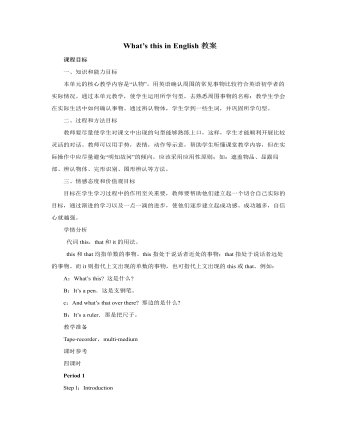
人教版新目标初中英语七年级上册What’s this in English教案
一、知识和能力目标本单元的核心教学内容是“认物”。用英语确认周围的常见事物比较符合英语初学者的实际情况。通过本单元教学,使学生运用所学句型,去熟悉周围事物的名称;教学生学会在实际生活中如何确认事物。通过辨认物体,学生学到一些生词,并巩固所学句型。二、过程和方法目标教师要尽量使学生对课文中出现的句型能够熟练上口,这样,学生才能顺利开展比较灵活的对话。教师可以用手势,表情,动作等示意,帮助学生听懂课堂教学内容,但在实际操作中应尽量避免“明知故问”的倾向,应该采用应用性原则;如:遮盖物品、显露局部、辨认物体、完形识别、图形辨认等方法。三、情感态度和价值观目标目标在学生学习过程中的作用至关重要,教师要帮助他们建立起一个切合自己实际的目标,通过渐进的学习以及一点一滴的进步,使他们逐步建立起成功感。成功越多,自信心就越强。
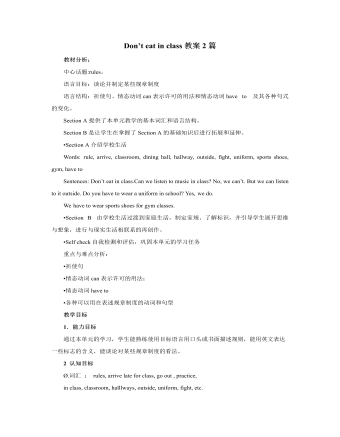
人教版新目标初中英语七年级下册Don’t eat in class教案2篇
Don’t fight. =You can’t fight. (板书,教读)教师把这些句子板书在黑板上,并请学生大声整齐地读祈使句和“can’t”句型,并让学生注意两种句型表达形式的不同和转换,“Don’t …=You can’t…”;并对学生说:These are our school rules. (板书,教读) You can’t break the school rules. Don’t break the school rules.(板书,教读)步骤3 :Practicea. T: Now, each of the students is breaking one of these rules.Please finish 1a.学生看图,完成1a的内容,检查答案并大声朗读校规。b. 听录音,完成1b,选出四位学生都违反了哪条校规;听之前,学生要读会英文名。c. 请两位学生朗读1c部分的句型;要求学生两人一组对话表演,SA扮演外校转来新生,SB告知本校校规。(学生可经过讨论,多说出他们想到的校规,不必只限于书上;教师应给予帮助)2) 第二课时(2a~4)步骤1 :warming up of revisionT: What are the rules at your school?学生使用“can”或祈使句表达各条校规;其中老师可引出“eat in the cafeteria outside”的表达。步骤2 :Practicea.T: Christina is an exchange student. She doesn’t know the rules. Let’s listen, what activities they’re talking about?学生听第一遍时,完成2a;第二遍时,完成2b;b. 请学生领读2c部分,看着2a完成的表格,理解2c活动的要求;分成小组针对2a进行问答;
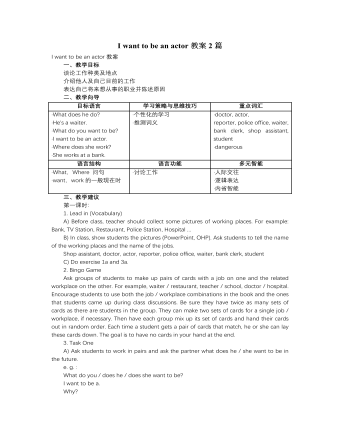
人教版新目标初中英语七年级下册I want to be an actor教案2篇
三、教学建议第一课时:1. Lead in (Vocabulary)A) Before class, teacher should collect some pictures of working places. For example: Bank, TV Station, Restaurant, Police Station, Hospital ...B) In class, show students the pictures (PowerPoint, OHP). Ask students to tell the name of the working places and the name of the jobs.Shop assistant, doctor, actor, reporter, police office, waiter, bank clerk, studentC) Do exercise 1a and 3a.2. Bingo GameAsk groups of students to make up pairs of cards with a job on one and the related workplace on the other. For example, waiter / restaurant, teacher / school, doctor / hospital. Encourage students to use both the job / workplace combinations in the book and the ones that students came up during class discussions. Be sure they have twice as many sets of cards as there are students in the group. They can make two sets of cards for a single job / workplace, if necessary. Then have each group mix up its set of cards and hand their cards out in random order. Each time a student gets a pair of cards that match, he or she can lay these cards down. The goal is to have no cards in your hand at the end.3. Task OneA) Ask students to work in pairs and ask the partner what does he / she want to be in the future.e. g. :What do you / does he / does she want to be?I want to be a.Why?Because it's (adj).B) Vocabulary: Section B, 1a4. Homework 1.2.
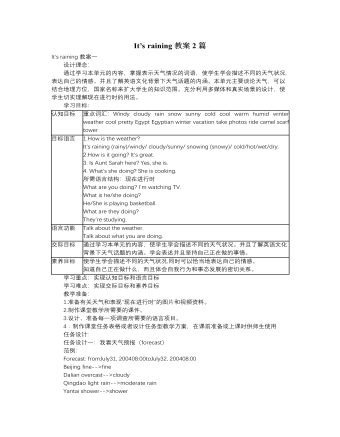
人教版新目标初中英语七年级下册It’s raining教案2篇
1 Each group choose one place to describe and what you are doing in it Choose one place, and describe what they are doing 2 Move around the room and give suggestions Talk about it and write it down 3 Ask one to show their works and act it Choose one of each group to make a report 4 Evaluate the best group and the best reporter Choose the best one Homework Ask your friends their ideal place and write about it教学反思:新课程标准中强调学生在课堂中的主体地位,在综合课中他们的主体地位就更加突出。在各个活动中给不同程度的学生不同层次的任务,让各层面的学生都有表现发挥的机会,从而产生对英语的兴趣。使用照片图片多媒体来辅助教学,效果更好。同时让了解其他国家风景,风俗的同学介绍ideal place,增加学生的背景知知识,实现跨学科交流的目的。教案点评:采用任务型教学模式,在各个活动中给不同程度的学生不同层次的任务,让各层面的学生都有表现发挥的机会,从而产生对英语的兴趣。使用照片图片多媒体来辅助教学,效果更好。让了解其他国家风景,风俗的同学介绍ideal place,增加学生的背景知识,实现跨学科交流的目的。
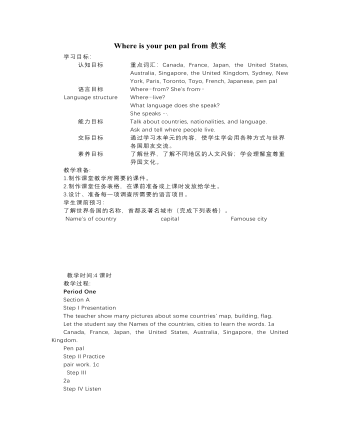
人教版新目标初中英语七年级下册Where is your pen pal from教案
2.1Match the country with the language.Step II Reading3a? let the students read the letter fast and answer the questions.? Let the students ask more questions about the letter as possible as the can.Step III Writing3b.Step IV. Pairwork2cStep V Listening2a, 2bStep V. HomeworkExercises book(1) P3Exercises book (2) P3Period FourStep I . Dictate the words and sentences in Unit1.Step II. Self-checkStep III. Check the answers for Exercises book in the unit.Step IV. Home workRevise and preparation for unit 2.教学反思:通过本单元的学习,学生基本可以谈论人们的国籍,居住城市及其所说的语言,通过书信方式去介绍自己并寻找笔友。但在涉及到国外的一些城市时,学生对这方面的知识相对欠缺,能介绍的城市并不多,也反应出学生课前预习不充分,这跟学生学习条件也有关,大多数学生无法通过网络获取所需信息。因此,在以后的教学中要多指导学生通过计算机网络获取信息,拓宽知识面。
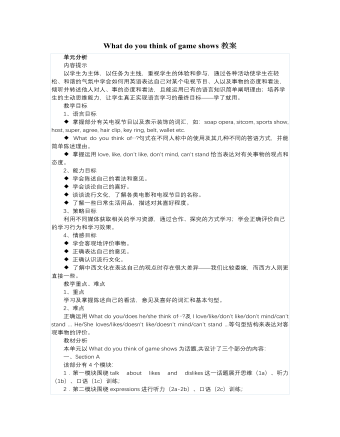
人教版新目标初中英语七年级下册What do you think of game shows教案
五、教学Section B-2c1. Pair work: What do you think of the belt/sunglasses/…? What does your father/mother/… think of your scarf/belt…?2. Group work(1). Teacher shows some different kinds of school uniforms (制服)and asks : “ What do you think of your school uniforms? If you have a chance to choose your school uniforms, what kind would you like to choose?”(2). Discuss in groups.(3).Get some Ss to report in class.说明:这一步旨在让学生运用已有的语言知识谈论对事物的看法和意见,并简单阐明理由,培养学生的主动思维能力和运用英语的能力。六、教学拓展调查电视节目的收视率任务:调查你周围的人对现在各种电视节目的反响。活动过程:1.教师布置任务,让学生调查周围的人(包括他的亲戚朋友和邻居)喜欢收看哪方面的电视节目。2.学生进行调查活动,运用本单元所学的句型What do you think of….? (Why?)What's your favorite game shows?What do you think of talk show?I doesn’t mind it.I like it.I love it.I can’t stand it.3.记录下排在前10位的TV Program,填写调查表,比较其收视率。
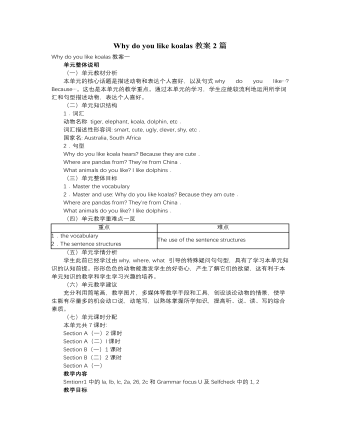
人教版新目标初中英语七年级下册Why do you like koalas教案2篇
单元整体说明(一)单元教材分析本单元的核心话题是描述动物和表达个人喜好,以及句式why do you like…? Because…。这也是本单元的教学重点。通过本单元的学习,学生应能较流利地运用所学词汇和句型描述动物,表达个人喜好。(二)单元知识结构1.词汇动物名称 tiger, elephant, koala, dolphin, etc.词汇描述性形容词: smart, cute, ugly, clever, shy, etc.国家名: Australia, South Africa2.句型Why do you like koala hears? Because they are cute.Where are pandas from? They're from China.What animals do you like? I like dolphins.(三)单元整体目标1.Master the vocabulary2.Master and use: Why do you like koalas? Because they am cute.Where are pandas from? They're from China.What animals do you like? I like dolphins.(四)单元教学重难点一览(五)单元学情分析学生此前已经学过由why, where, what 引导的特殊疑问句句型,具有了学习本单元知识的认知前提。形形色色的动物能激发学生的好奇心,产生了解它们的欲望,这有利于本单元知识的教学和学生学习兴趣的培养。

人教版新目标初中英语八年级上册Can you come to my party教案3篇
Step 3 (3b)First, tell the students when we talk about our future plans, we often use: I’m+verb+ing When we talk about what we must do, we use have to. Ask the students to fill in the blanks in 3b. The answers are: shopping, go to see, a test, I’m going, my family. Step 4 (3c)Let the students write an e-mail message to a friend. Say why you can’t visit next. Before the exercise, ask the students to give some possible answers and write them on the blackboard. So the students will feel easy to finish the writing exercise. After they finish it, Let them to correct it in groups first. Each group chooses theirs best one to read in front of the whole class. Step 5 ( planning a party )First read the conversation in the box together. Then ask the students to turn to page 88.Write down everything you have to do next week. Write in all the things you have to do . Ask the students to look at the list. Ask them “What day are you free?” This is when you can have your party. Step 6 (Self check 1 )Let the students to fill in the blanks with the words given. Change the forms of the words if possible. Then make their own sentences. The answers are: visit, playing, have to, study, comeStep 7 (Self check 2)Imagine you are Marie. Read the information and look at your schedule. Write replies to the invitation.
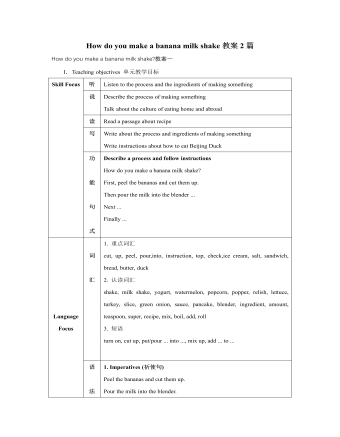
人教版新目标初中英语八年级上册How do you make a banana milk shake教案2篇
1. First, ... then, ... next, ... finally, ...首先,……然后,……接着,……最后,……这是英语中表达做某事的步骤的一种说法。如果步骤较多,还可以说:first-next-after that-later on-finally/at last通常你会听到说英语国家的人在说 first, next, then, finally 和后面的内容时,他们会做一些停顿。这样就能提前告诉听者接下来讲的是一系列的步骤。这一点在朗读和听力中应特别注意。2. how many, how much均为疑问词,同是“多少”,但用法不同。请看:how many修饰可数名词复数,how much修饰不可数名词。但在用法上,同学们常犯如下错误:1) [误] How many are there bananas on the table?[正] How many bananas are there on the table?[析] how many, how much 中的many,much是形容词,常修饰名词作定语,故后面跟名词。2) [误]How much tea are there on the table?[正]How much tea is there on the table?[析] how much修饰不可数名词时,谓语动词用单数。how many与how much的区别可简记为:前how many:问“多少”,复数名词后面跑;how much问“多少”,不可数名词单数好。前者答语用基数词,后者答语用数量关系。

人教版新目标初中英语八年级上册Could you please clean your room教案3篇
一、 教学内容Section A 1a----1c二、 教学目标1.学习词汇do the dishes, make the bed, take out the trash, fold the clothes, do the laundry, sweep the floor, clean the living room.2.句型 Could you please clean your room? Yes, sure.三、 教学准备 学生预习本单元所有的词汇多媒体课件 活动表 奖品四、 教学过程Pre-task1. Warming upEnjoy ourselves. Watch cartoon Cinderella. 看动画片段《灰姑娘》导如入本课话题和新词汇“chores”美丽善良的鬼姑娘因继母的嫉妒,每天得做所有的家务。片段的主题使学生联想到本课的话题。2. learn new words and phrasesLook! What is she / he dong? 看图学习动词词组do chores, do the dishes, make the bed, take out the trash, fold the clothes, do the laundry, clean the living room.3. Guessing game.What is she doing ? 4. Pair work. 1a, Do you do these things at home? Write “Y” for “yes” and “N” for “no”.5. Listening . 1b , Peter’s chores or Mom’s chores?理解目标语Could you please clean your room? Yes, sure.Write “M” for Mom’s chores, “P” for Peter’s chores in the chart.6. PairworkLook at the picture,Ask your partner to do the chores that you see. 7. Interview Who is the most able at home? 1) What chores do you do at home? How often do you do the chores? Work in four, interview each of the students in the group, fill in the chart.

